Siberian Huskies are beautiful dogs. They look like wolves, and have thick, soft coats, that make them infinitely cuddly. They have piercing eyes, and wonderful masks, that give them a roguish and unique look.
Siberians can make very good family pets. If properly trained, they can be very good with people, children, and other dogs. Indeed, Sibes are commonly known for their friendliness toward people.

Although they may look like fierce wolves, they have the heart of Casanova. All my Huskies want to do, is greet everyone and give them licks.
However, many people have trouble with this breed, and many Sibes get surrendered every year.
Consider these Siberian Husky facts, before going out and getting a puppy. The Siberian Husky is a very special and lovable breed, but they may not be the right breed for everyone.
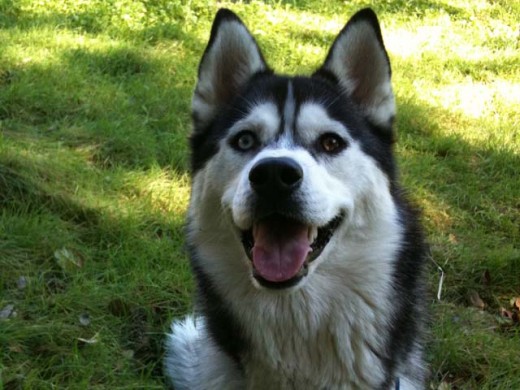
1. Siberian Huskies Shed a Lot!
Be ready to have dog hair all over the house – floors, carpets, clothing, furniture, everywhere.
If we are allergic to dog hair, or like our home to be very clean, then the Siberian Husky is not for us.
When I was looking for a Sibe, I talked to a few breeders in my area. The first thing they all said was, “Siberians shed a lot”. I mentioned that my other dog, a Shiba Inu, also has a double coat, and also sheds a fair amount. However, they all said, “Siberians shed a lot more”.


And they do! A whole lot more.
Therefore, it is very important to train our Husky puppy to enjoy the grooming experience.
- I start with a soft brush, and lightly comb my dog’s body for a short period of time.
- I do this often, and pair it with food rewards.
- Once my puppy is comfortable with the brushing process, I very slowly extend the length of our grooming session.
- Finally, I repeat the process with a more solid brush, such as the Furminator.
Frequent brushing is a good idea to keep our Husky clean, and clear out loose hair. The more hair on the Furminator, the less hair on the floor.
About twice a year, my Sibes blow their coat. During this time, there will be more fur than ever. To keep things under control, I try to brush every day. Remember to always keep brushing sessions fun, rewarding, and not overly long.
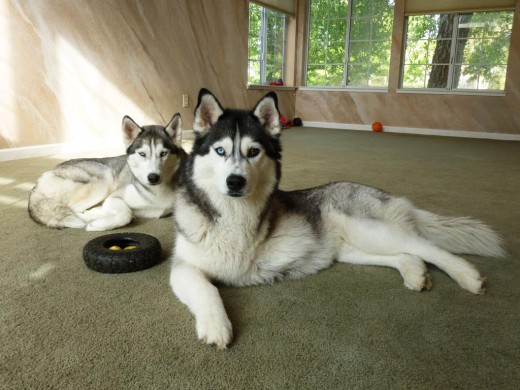
2. Siberian Huskies Make Awful Watch Dogs
Because Huskies look like wolves, many people assume that they are fierce dogs. Some people may even think that they are wolf hybrids.
However, a Sibe is more of a lover and less of a fighter.
When confronted with a stranger, my Husky will usually run up to him, give licks, and beg for food. As a result, Sibes do not make very good watch dogs. They will not only welcome everyone into your house, but will also give them the royal lick treatment.
If we want a dog that is only loyal to us and our family, then the Siberian Husky is not for us.
My Huskies are naturally happy and trusting dogs, who like to be with everyone. That is one of the things that I love most about them.
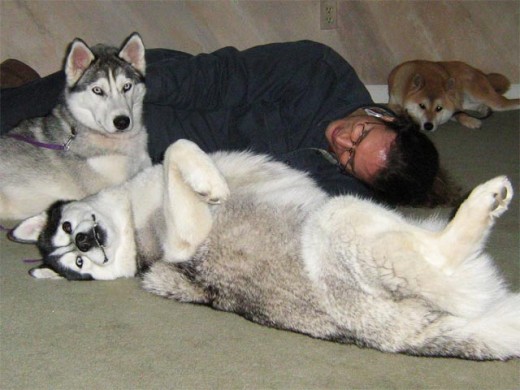
The Siberian Husky is not a watch dog, although those ignorant of his true nature may be frightened by his appearance. If you want a dog with aggressive guard-dog instincts . . . don’t buy a Siberian.
~~[SHCA]Leave your home in the care of a “guard” Siberian and he will most likely welcome an intruder with open arms, fetch (for the first time in his life) your valuables and show him the best route of escape–after all, Siberians are great escape artists.
~~[Siberian Rescue Site]
Note – This does not mean that Huskies will never be aggressive toward people. A dog’s behavior is determined both by genetics (breeding), as well as by training, socialization, context, and past experiences. A dog may become aggressive as a result of improper training, bad social experiences, insufficient socialization, and more.
For reasons of safety, it is important to ensure that our companion dogs are not people aggressive. Most companion dogs today guard us, by sounding an alert when unknown or strange people come close to our house. These dogs are not people aggressive. They do not bark, lunge, or growl at passers-by during walks. They are not aggressive toward guests and unknown visitors, who may need to work in or around our house. Their job is simply to alert us, when unusual events occur close to home. Anything more would quickly become dangerous and risky.
Highly trained guard dogs, such as those employed by law-enforcement, may be trained to attack or restrain an intruder. However, they are always under the control of their handler, are extremely well managed, and will only attack on-command or when they think their handler is in clear danger (as defined during training). They also do not bark or growl at pedestrians.
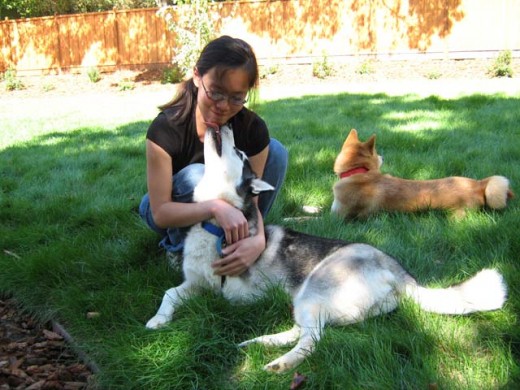
3. Siberian Huskies Have High Energy
They are intelligent, athletic, and were bred to pull sleds for extremely long distances, in the freezing cold. Therefore, be prepared to provide a Husky with a lot of mental and physical exercise.
A young Husky needs activity almost all day round. At around one-year old, my Sibe puppy sleeps for perhaps 3-4 hours during the day, and about 10 hours during the night. That leaves about 10 hours during the day where she is on the go.
She drains her energy most by playing with my other dog, a Shiba Inu. However, even my Shiba cannot fully keep up with her.


In addition to the playing, she works for all of her food, has long walks in the park several times a week, has structured dog play sessions, dog obedience training sessions, and still has energy left over to explore and dig in our backyard.
If bored, a Husky can become unhappy. He will likely escape, or use our house and belongings as chew toys. Unless our backyard is extremely secure, he can easily jump over or dig under a fence, in order to find adventure elsewhere.
If we are away at work for most of the day, then the Siberian Husky is probably not for us.
Siberians like having company and activity all day long. It is possible that a Husky can keep himself occupied if we have other dogs, but he may also lead our entire pack into mischief!
Sibes do best when there is frequent human supervision, throughout the day.
Siberians are a gregarious lot and need the company of other dogs or of people at all times.
~~[SHCA]The Husky needs lots of exercise and entertainment. They love to run and play, but must be allowed to do so safely.
~~[Hillside SPCA]

4. Siberian Huskies Are Independent Thinkers
They have a very independent mind and spirit, and will only perform, if we make it worth their while.
If we want an obedient dog that only lives to please us, then the Siberian Husky is not for us.
A Sibe is not a “yes sir, no sir“, kind of dog. To live well with him, we need to be fair, but firm. We need to consistently enforce our house rules, or he will take over the house.
The best way to train a Husky, is through the control of resources. Teach him that the best way to get what he wants, is to first do what we want. I use reward obedience training, and follow the Nothing in Life is Free program. Harsher techniques can make a Siberian distrustful, and ruin the natural free spirit of the breed.
Huskies are independent hunters. Their original breeders, the Chukchi of Northeastern Asia, would let their dogs free during the summer months to hunt for food on their own.
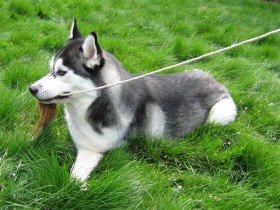
This has two very important consequences for living with a Husky today –
- A Siberian is not to be trusted with cats or other small animals. He can be trained to live with cats, but his instinct is to hunt them;
- A Siberian is not to be trusted off-leash. If he sees a small animal, he will likely bolt after it, and forget about cars, commands, and everything else. By the time he comes to his senses, he may be lost and far from home.
I have gotten a few comments about cats lately, so let me be clear …
Sibes can be trained to live with household cats. However, they usually have high prey drive, and will likely want to hunt and chase small animals, including squirrels, mice, and cats. Just because a Siberian gets along with our house cats, does not mean he will treat other neighborhood cats in the same way.
Huskies are bred to run and pull. This makes them more difficult to leash train than many other breeds. To train a Husky to walk on a leash, we need to have an immense amount of patience. Always be firm and consistent with the no-pulling rule, and reward good behavior.
If we do not have a large backyard, bring our Sibe to an enclosed park or soccer field, so that he can have some nice off-leash time to run, run, run.
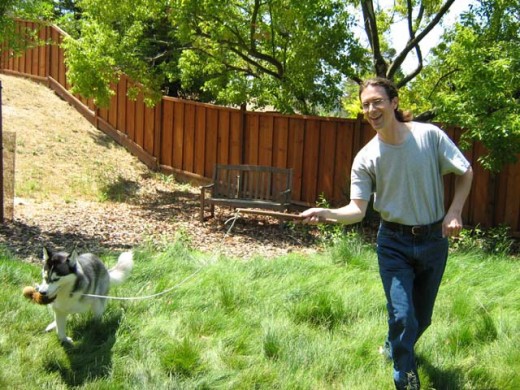
5. Siberian Huskies Are Not the Easiest Dogs to Potty Train
Certain dogs, like the Shiba Inu, are naturally clean and absolutely do not like soiling their living space. Because of their natural cleanliness, they are extremely easy to house train.
Sibes do not have that natural sense of cleanliness. In fact, they do not mind playing, and running around in their own waste products. Therefore, we must make it worth their while to potty outside.
Supervise our Husky puppy at all times, until he is fully house trained. Reward him well for pottying outside with high priority dog treats, play, and praise. If we are consistent with our puppy potty training, he will learn quickly, and be happy to go outside after a few weeks.
In addition, as Gigi points out, potty training difficulty is very dependent on what the dog or puppy is used to, in his previous environment. Puppy mill and pet store puppies are caged, most of the time. As a result, they will be harder to house train, because they are accustomed to going in their crates.

Where to Get a Siberian Husky Puppy
If we still want a Husky, then visit the Siberian Husky Club of America for a breeder list. Also consider adopting one from a local Husky rescue.
It really makes a BIG difference to get a puppy from an accredited breeder.
Please do not buy a puppy from online puppy sites or pet stores. Most of their puppies come from backyard breeders or puppy mills. Buying from them, will only help support and continue the dog cruelty of these unscrupulous puppy breeders.
If we are concerned about the initial cost of a puppy, consider that backyard breeders and puppy mills frequently produce unhealthy and unbalanced puppies. They will end up costing us a lot more, in terms of vet bills, dog training bills, and property destruction.
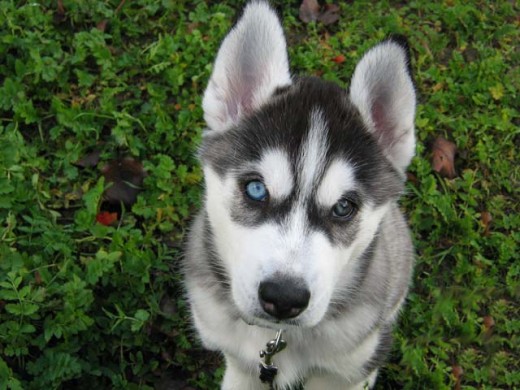
Siberian Huskies Are Wonderful Dogs

I love my Sibes. However, just because I think Huskies are wonderful dogs, does not mean that everyone else will think so as well; nor does it mean that they will fit into someone else’s lifestyle.
Clearly, each dog is an individual and will differ in terms of prey drive, energy level, obedience, and more. However, general breed characteristics and information from reputable sources, will give us a better idea of what to expect.
Often, there is conflicting information on the web. Therefore, one good place to start is with the AKC-recognized national breed club – The Siberian Husky Club of America.
Captivating in their beauty, grace and childlike demeanor, Siberians catch the eye of adults and children alike. They can be wonderful dogs for the well-informed or experienced Husky owner. However, they are NOT the breed for everyone and definitely not for first time dog owners. Too many wind up lost, in shelters, killed on the highway, abandoned or abused because the owner didn’t understand the breed and it’s challenging traits.
~~[Hillside SPCA]
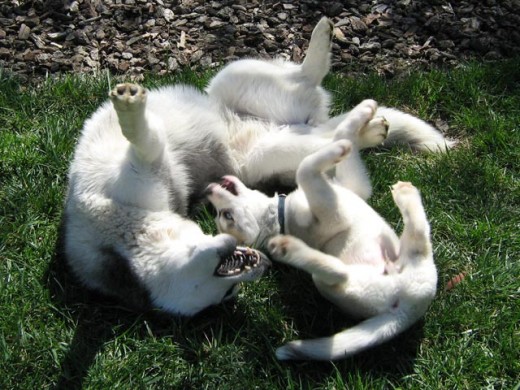
We have a purebred Sibe, Gunner, age 4 years, who’s neutered. My son got him from a top breeder, who socialized him with other non-Husky dogs & many people from early puppyhood til he was old enough to leave Mom. But my son had to give him up because his wife is allergic to dander.
He grew VERY-large for a Sibe, 30″ at the shoulder, 120 lb. & not fat. He’s always been fed raw meat & chicken organs (no intestines), Dr. Marty’s, & Blue Buffalo, etc. quality food.
He’s very well-behaved, loving all people & all other dogs who’ll let him, but HE KNOWS HOW TO KILL, in a heartbeat ! He killed a Chi who was stupid enough to attack him, unprovoked. Gunner simply crushed it in his jaws in an instant. One day, an orange dog that looked like a Lab charged & attacked Gunner in our own yard while we were outside, with him on a 50-frro chain. We NEVER have Gunner out unchained or unleashed !) Gunner instantly grabbed the other dog by the neck, pinned it with his paws & ripped its neck open, killing it instantly. During both these bouts, Gunner naver made a sound. (He also killed a possum one dark AM the same way, almost tearing it in two in a split second.)
However, Gunner has never been the aggressor with other dogs. He gets along very well with my son’s two Chis & Dalmatian. He has buddies in our ‘hood, three Great Danes & a Newfie. One day, an escaped Jack Russell came into the yard, & he & Gunner played together til the JR’s human drove by looking for him, & was very happy to get him back. (She offered me $$, but I declined, saying her friendship was reward enough.)
Gunner is VERY quiet; he seldom vocalizes at all, & we’ve never heard him snarl or growl. if another dog barks or acts aggressive toward him, we must watch his body language. If he stands very rigid, staring, with ears perked fully, tail down, & mouth shut tight, I know he’s ready to attack, & I’ll try to get him away from the other dog.
I had a friend tell me that feeding Gunner raw meat would make him into more of a killer, but I know better. But our vet, who’s also a trainer, said there’s no use spending $$ trying to train Gunner not to retaliate fatally toward an aggressive dog, as that was likely in his genetics, & all dogs will try to defend themselves. Also, all Sibes have a strong prey drive no matter how well-fed they are, & we must act accordingly.
Any idea why he grew so big? He IS a purebred from a very good blood line that includes several champion show dogs.